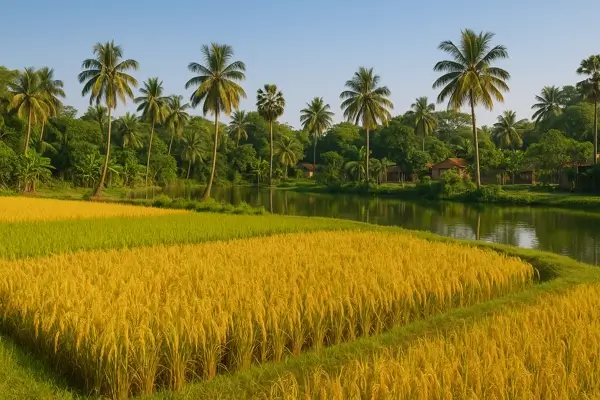
A Country of Rivers
Bangladesh is often called the "Land of Rivers" due to its vast network of rivers, including the mighty Ganges, Brahmaputra, and Meghna. These rivers shape the country’s landscape, culture, and economy. They provide water for agriculture, transportation, and support a thriving fishing industry, while also contributing to frequent floods during monsoon season.
A Rich Cultural Heritage
Bangladesh has a rich and diverse cultural heritage, influenced by centuries of Islamic, Hindu, and British colonial rule. The country’s literature, music, art, and festivals reflect this diverse history. The Bengali language, which is spoken by the majority of the population, is an important part of the nation’s identity and is celebrated annually on International Mother Language Day.
Birthplace of Bengali Language Movement
Bangladesh is deeply connected to the history of language and culture. In 1952, students protested for the right to speak Bengali as the official language of Pakistan, which led to the deaths of several students. This movement became a cornerstone in the fight for independence, and February 21 is now celebrated as International Mother Language Day worldwide.
The Sundarbans
The Sundarbans, located in the southwestern part of Bangladesh, is the largest mangrove forest in the world and a UNESCO World Heritage site. It is home to the endangered Bengal tiger and many other unique species of flora and fauna. The area serves as a vital ecosystem for marine life and helps protect the coast from storms and erosion.
A Country with a Huge Population
Bangladesh is one of the most densely populated countries in the world, with over 160 million people living in an area smaller than the state of Iowa in the United States. The high population density has resulted in challenges related to urbanization, resource distribution, and poverty, but it has also contributed to a vibrant, resilient society.
World’s Largest Textile Industry
Bangladesh has one of the world’s largest textile and garment industries, which is a key driver of the national economy. The country is the second-largest exporter of clothing, primarily to the United States and Europe. The industry provides millions of jobs, although it has faced criticism for labor rights and safety concerns.
The Royal Bengal Tiger
The Royal Bengal tiger, which is found in the Sundarbans, is the national animal of Bangladesh. This majestic creature symbolizes strength and courage and is an important cultural icon for the country. The Sundarbans are one of the last refuges of the Bengal tiger in the wild.
Rich History of Independence
Bangladesh gained its independence in 1971 after a brutal war of independence with Pakistan. The war, known as the Bangladesh Liberation War, lasted for nine months and resulted in the loss of millions of lives. The victory led to the formation of Bangladesh as a sovereign state. December 16 is celebrated as Victory Day to commemorate the end of the war.
A Diverse Cuisine
Bangladesh is known for its flavorful and spicy cuisine, which incorporates rice, fish, and lentils as staples. Signature dishes include hilsa fish, bhuna khichuri (spiced rice with lentils), and panta bhat (fermented rice). The country's cuisine is also influenced by Mughal, Persian, and regional traditions, offering a variety of rich flavors and aromatic spices.
A Country of Greenery
Despite being densely populated, Bangladesh has vast areas of natural beauty, including lush green forests, fields, and tea gardens. The country’s monsoon climate supports the growth of rice paddies and jute fields, and it is also famous for its tea plantations in regions like Sylhet, which produce some of the world’s finest tea.
The National Flower
The national flower of Bangladesh is the water lily, also known as the Shapla. It is a symbol of purity, beauty, and tranquility, and is often depicted in the country’s artwork and traditional crafts.
Cricket Craze
Cricket is the most popular sport in Bangladesh, with the national team being a source of pride for many citizens. The country has a passionate fan base and regularly hosts international matches, including the ICC World Cup. The sport has become a cultural phenomenon, with street cricket being a common sight in towns and cities across the country.



